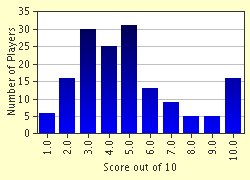Quiz Answer Key and Fun Facts
1. You just broke up with your girlfriend and have all the time in the world and want to take a trip. You get into a canoe without any paddles, and enough food and water, in Miami. You want to go to Seattle. How long does it take you to get there?
2. There are seven major currents in the world. The currents in the Northern Hemisphere rotate clockwise, while the ones in the Southern Hemisphere rotate counter-clockwise. What is the term used to explain this phenomenon?
3. What is the name of the current that flows by the Gulf of Alaska and brings cold water down the western coast of the USA?
4. What is the pressure boundary layer between the oceans' surface layer and deep waters called?
5. The oceans move how much water each day?
6. Which current is unusual in that it reverses its direction twice a year?
7. What is used to trace the world's currents?
8. Ocean water and currents affect climate.
9. What causes waves?
10. Continents cause currents to form almost enclosed circular patterns called what?
Source: Author
umpolo
This quiz was reviewed by FunTrivia editor
crisw before going online.
Any errors found in FunTrivia content are routinely corrected through our feedback system.

